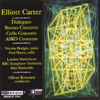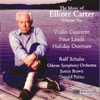Carter Dialogues; Boston Concerto; Cello Concerto
Elliott Carter in the Indian summer of his remarkable career – a late bloomer
View record and artist detailsRecord and Artist Details
Composer or Director: Elliott (Cook) Carter
Label: Bridge
Magazine Review Date: 4/2006
Media Format: CD or Download
Media Runtime: 61
Mastering:
Stereo
Catalogue Number: BRIDGE9184

Tracks:
| Composition | Artist Credit |
|---|---|
| Dialogues |
Elliott (Cook) Carter, Composer
Elliott (Cook) Carter, Composer London Sinfonietta Nicolas Hodges, Piano Oliver Knussen, Conductor |
| Boston Concerto |
Elliott (Cook) Carter, Composer
BBC Symphony Orchestra Elliott (Cook) Carter, Composer Oliver Knussen, Conductor |
| Concerto for Cello and Orchestra |
Elliott (Cook) Carter, Composer
BBC Symphony Orchestra Elliott (Cook) Carter, Composer Fred Sherry, Cello Oliver Knussen, Conductor |
| Asko Concerto |
Elliott (Cook) Carter, Composer
Asko Ensemble Elliott (Cook) Carter, Composer Oliver Knussen, Conductor |
Composer or Director: Elliott (Cook) Carter
Label: Bridge
Magazine Review Date: 4/2006
Media Format: CD or Download
Media Runtime: 58
Mastering:
Stereo
DDD
Catalogue Number: BRIDGE9177

Tracks:
| Composition | Artist Credit |
|---|---|
| Concerto for Violin and Orchestra |
Elliott (Cook) Carter, Composer
Elliott (Cook) Carter, Composer Justin Brown, Conductor Odense Symphony Orchestra Rolf Schulte, Violin |
| (4) Lauds |
Elliott (Cook) Carter, Composer
Elliott (Cook) Carter, Composer Rolf Schulte, Violin |
| Holiday Overture |
Elliott (Cook) Carter, Composer
Donald Palma, Conductor Elliott (Cook) Carter, Composer Odense Symphony Orchestra |
Author: K Smith
Having these two volumes of Bridge’s Elliott Carter series arrive almost concurrently helps put the composer’s career in perspective. Despite the pleasing tonality and unapologetic American-ness of Carter’s 1945 Holiday Overture (the connection with Ives’s Holidays Symphony worn handily in its title), the dense counterpoint and rhythmic complexity are nonetheless already in place. The aggressively modernist Carter we usually think of came of age shortly afterward and is still going strong in the Violin Concerto (1990), where musical lines remain unrestrained by tonality or conventional rhythmic pulse. Those lines may not be as individualistic as in the composer’s chamber works but they nonetheless need firm guidance from the podium. Justin Brown shows a sure sense of each line and its destination, making instrumental outbursts more purposeful and less impulsive than they might otherwise seem. It provides, in fact, a nearly unified orchestral front against Rolf Schulte’s fairly lyrical solo playing, with textural contrasts duly marking emotional contrasts.
Four Lauds for solo violin, part of an ongoing series of short virtuoso works, traces Carter’s more recent transition, from the assertive Riconoscenza per Goffredo Petrassi (1984) to the more freely ‘romantic’ (the composer’s own description) Rhapsodic Musings (2000). Though hardly as prevalent as his chamber works, the inner musical lines remain surprisingly vital, setting up a palpable internal counterpoint that Schulte deftly navigates.
At first glance, Dialogues (2003) would seem to be in the old Carter model, where different musical lines unfold with such clearly delineated personalities that they’re often compared to characters in a play. Carter describes the piece as a conversation between piano and orchestra, but the lively discourse continues with little of his former abrasiveness. This is civilised cocktail chatter rather than a raucous town meeting, with musical points respecting each other’s space rather than yelling each other down. The Cello Concerto (2001), by contrast, is more a solo oration with some periodic cheers from the crowd. A full decade away from the Violin Concerto, the piece falls back much more squarely on traditional string phrasing and playing technique, but under soloist Fred Sherry the rhetoric is less of a crutch than a platform to make the main points clear and fresh.
Without the benefit of soloists, the remaining concerto grosso works here, the ASKO Concerto (2000) and the Boston Concerto (2002), indeed confirm a change in Carter’s musical approach. It might be too much of a stretch to blame this new-found clarity on the composer writing his first opera in 1999 (at the age of 90!) but clearly Carter has started letting his musical ideas sing as well as shout.
Discover the world's largest classical music catalogue with Presto Music.

Gramophone Digital Club
- Digital Edition
- Digital Archive
- Reviews Database
- Full website access
From £8.75 / month
Subscribe
Gramophone Full Club
- Print Edition
- Digital Edition
- Digital Archive
- Reviews Database
- Full website access
From £11.00 / month
Subscribe
If you are a library, university or other organisation that would be interested in an institutional subscription to Gramophone please click here for further information.




